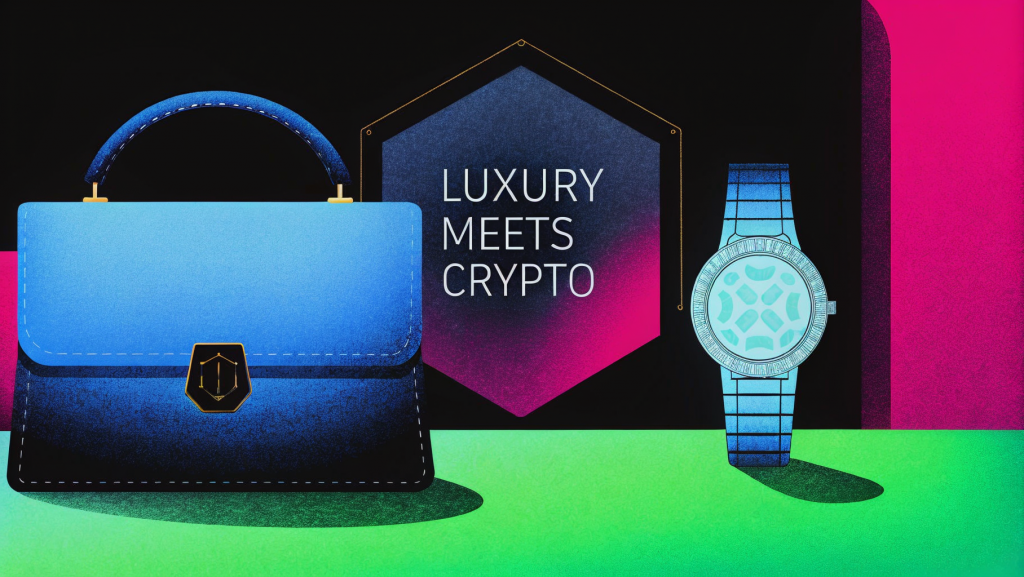Crypto in Luxury: How Blockchain Fights Fake Designer Goods

The luxury goods industry, renowned for its exclusivity and tradition, is undergoing a significant transformation driven by the rise of cryptocurrencies and blockchain technology. This convergence of cutting-edge technology and high-end consumerism is reshaping how luxury brands interact with their customers, ensure authenticity, and navigate the evolving digital landscape.
The Rise of Crypto Payments in Luxury
The adoption of cryptocurrencies as a payment method is gaining momentum in the luxury goods sector. This shift is fueled by several factors, including the increasing appeal to younger clientele, the desire to attract tech-savvy and affluent customers, and the need to diversify revenue streams in a changing economic climate. As reported by the Metaverse Fashion Council, luxury brands are actively seeking to accept crypto payments. This represents a strategic shift towards modernizing retail operations in the luxury industry. By embracing blockchain and cryptocurrency, luxury brands can enhance the customer experience, solidify their positions as innovators in the market, and maintain the high standards of authenticity and exclusivity that define the luxury industry. As Ainvest highlights in their article on Bitcoin’s rise and luxury brands embracing crypto payments, this trend is gaining traction.
One significant way cryptocurrency and blockchain technology are transforming the luxury goods industry is by creating new business models. For example, luxury brands are now leveraging blockchain technology to create unique limited-edition products. Coinify explores how cryptocurrency payments are making luxury goods more accessible, highlighting the role of blockchain in enhancing transparency and security in transactions.

Several luxury brands have already taken the plunge into the world of crypto payments. Gucci, for instance, accepts up to 10 different cryptocurrencies in 70% of its directly operated stores in the U.S. Other brands like Off-White, Philipp Plein, and Equinox have also integrated crypto payment options, as noted by RocketFuel in their piece on why luxury brands need to accept crypto payments. Online luxury fashion platform Farfetch accepts six cryptocurrencies, including Bitcoin and Ethereum, in over 37 countries, a trend further detailed in Radom’s blog on luxury brands accepting crypto in 2024. This trend is not limited to individual brands. Upscale French department store Printemps has partnered with Binance to become the first European department store to accept cryptocurrencies, signaling a broader acceptance, as reported by CNA in their article on luxury brands considering crypto payments.
Combating Counterfeit Goods in the Luxury Market
The luxury goods industry faces a significant challenge in the form of counterfeit products. These fake goods not only damage brand reputation and erode consumer trust but also pose potential safety risks and contribute to illicit activities. Luxury brands are actively employing various strategies to combat counterfeiting and protect their intellectual property.
Traditional methods include:
- Holograms: Security holograms are affixed to products to provide visual authentication. However, sophisticated counterfeiters can replicate these with high accuracy, making it challenging for consumers to differentiate between genuine and fake products.
- RFID Technology: Radio-frequency identification (RFID) tags embedded in products allow brands to track their movement and verify authenticity. These tags are more difficult to replicate, making them an effective anti-counterfeiting measure.
- Watermarks: Incorporating watermarks into the paper or packaging material of luxury products adds another layer of security. These hidden images or patterns are difficult to reproduce and can be used to authenticate genuine items.
CXOToday.com discusses these methods in detail, highlighting the use of anti-counterfeiting technology to protect luxury brands.
Beyond these traditional approaches, luxury brands are increasingly turning to more advanced solutions:
- Comprehensive Monitoring and Enforcement: Brands are utilizing AI-powered monitoring technology and human expertise to identify and remove counterfeit products from online marketplaces, social media platforms, and other channels. Corsearch delves into the scale and dangers of counterfeits, emphasizing the dark side of luxury.
- Collaboration with Customs Officials: Working closely with customs authorities helps to intercept counterfeit goods at borders and prevent them from entering the market. This involves registering trademarks with customs and educating officials on how to identify fake products. Covington & Burling LLP outlines how luxury brands are fighting back against counterfeiting in their report.
- Enhanced Security Features: Companies like NanoMatriX are developing innovative solutions that combine tamper-evident NFC tags with NFC management platforms and AI to detect unusual activity and prevent counterfeiting. NanoMatriX provides insights into luxury brand protection in an era of counterfeits.
These efforts demonstrate the commitment of luxury brands to protect their products and consumers from the detrimental effects of counterfeiting.
Blockchain: Ensuring Authenticity and Transparency
Beyond payments, blockchain technology is revolutionizing how luxury brands ensure the authenticity of their products and combat counterfeiting. By providing a secure and transparent record of a product’s journey from origin to consumer, blockchain is enhancing trust and confidence in the luxury goods market. Verix explains how blockchain authentication redefines luxury transparency. Blockchain empowers stakeholders, including consumers, to verify the authenticity and provenance of luxury goods, significantly reducing the risk of counterfeit products flooding the market. NeoNomad discusses the use of blockchain for traceability in luxury goods.
Here’s how luxury brands are leveraging blockchain for authentication:
- Digital Product Passports: Each luxury item is assigned a unique digital identity on the blockchain, creating a tamper-proof record of its origin, ownership history, and transactions.
- Supply Chain Traceability: Blockchain allows brands to track raw materials and finished products throughout the supply chain, ensuring ethical sourcing and verifying authenticity. An article on Medium by Kalyanjit Hatibaruah details how luxury brands are leveraging blockchain and AI for business impact.
- Counterfeit Detection: The immutable nature of blockchain makes it nearly impossible to create counterfeit products with the same verifiable digital identity as genuine items. Hammoq explores how blockchain is securing the future of pre-loved luxury goods.
- Digital Asset Management: Blockchain can be used to manage and track ownership of digital assets associated with luxury goods, such as digital artwork or virtual experiences.
- Exclusive NFT Projects: Brands are launching limited-edition non-fungible tokens (NFTs) linked to physical products, creating unique and verifiable ownership experiences for consumers. Scaling Parrots provides 10 examples of blockchain for luxury brands.
Millennials and Gen Z: Driving Crypto Adoption in Luxury
Millennials and Gen Z are not only more likely to use cryptocurrencies but are also significant consumers of luxury goods. Their spending habits are reshaping the luxury market, with their purchases outpacing those of older generations. Glossy reports on how Gen Z and millennials are transforming luxury retail. Industry analysis indicates that 40% of luxury buyers will be Gen Z and millennials by 2035. CoinRemitter highlights the impact of crypto payments on the luxury goods industry.
Several factors contribute to the higher adoption of cryptocurrencies among these younger demographics:
- Technological Savvy: Millennials and Gen Z are digital natives who are comfortable with online transactions and digital platforms.
- Distrust in Traditional Finance: They are more likely to embrace decentralized finance due to concerns about the limitations and flaws of traditional financial institutions. Roqqu Pay discusses the reasons why Millennials and Gen Zs are dominating digital investments.
- Social Media Influence: Online communities and social media platforms play a significant role in shaping their investment decisions and openness to cryptocurrencies. Worldwide, a quarter of young consumers aged 18-39 have made purchases via social media, while over 40 percent of them follow an influencer. Statista provides statistics on luxury goods, Gen Z, and millennials.
- Shifting Payments Landscape: The expansion of digital wallets to accommodate cryptocurrencies is further driving the adoption of digital assets among younger generations. IDEX Biometrics explores how Millennials and Gen Z are transforming the future of payments.
By accepting crypto payments, luxury brands can tap into this growing market of young, affluent consumers who are eager to embrace new technologies and alternative payment solutions. It’s also important to note that Millennials and Gen Z are more willing to spend on luxury goods due to a higher propensity for self-indulgence, as noted by the McGill Business Review on the new face of high-end consumption.
Luxury Leaders in Blockchain Authentication
Several luxury brands are leading the way in implementing blockchain technology for authentication:
| Brand | Blockchain Initiative | Key Features |
|---|---|---|
| Aura Blockchain Consortium | A collaborative platform founded by LVMH, Prada, and Cartier | Sets industry standards for blockchain solutions, provides product tracking and tracing services. |
| Louis Vuitton | AURA platform | Enables customers to verify product authenticity using a mobile app. |
| Prada | Digital identity solution with Anthropic | Uses public blockchain infrastructure to track product origin and transaction history. |
| Cartier | Partnership with Chronicled | Records unique product serial numbers on a public ledger for enhanced security. |
| Burberry | Blockchain exploration | Focuses on enhancing supply chain transparency and traceability. |
These brands are demonstrating the potential of blockchain to enhance trust, combat counterfeiting, and provide a more secure and transparent luxury experience for consumers.
Aurpay.net: Empowering Luxury Brands with Blockchain
Aurpay.net is a decentralized digital currency payment service that offers several advantages for luxury brands looking to embrace crypto payments. Ecwid provides an overview of Aurpay and its benefits for accepting crypto payments.

Here’s how Aurpay.net can help:
- Secure Transactions: Aurpay.net provides a non-custodial solution, meaning that funds and private keys remain under the control of the merchant, ensuring maximum security.
- Customization: Aurpay.net offers customization options to meet the specific needs of luxury brands.
- Seamless Integration: It allows customers to pay with cryptocurrencies without registering on the merchant’s site, simplifying the payment process.
- Real-time Exchange Rates: Aurpay.net uses real-time exchange rates to ensure accurate pricing and minimize the risk of volatility.
By leveraging Aurpay.net, luxury brands can confidently accept crypto payments while maintaining control over their funds and providing a secure and user-friendly experience for their customers.
Conclusion: A New Era for Luxury
The luxury goods industry is embracing the transformative potential of cryptocurrencies and blockchain technology. By adopting crypto payments, luxury brands can attract new customers, enhance their brand image, and tap into the growing market of digital natives, particularly Millennials and Gen Z, who are poised to become the dominant consumer group in the luxury market, as highlighted by CoinRemitter. Blockchain technology provides a powerful tool for ensuring authenticity, combating counterfeiting, and enhancing transparency in the luxury goods market.
This shift towards digital solutions is not just about adopting new technologies; it represents a fundamental change in the relationship between luxury brands and consumers. Blockchain empowers consumers with greater transparency and control over their purchases, fostering trust and loyalty. The ability to verify authenticity and trace the origin of products aligns with the increasing demand for ethical and sustainable practices in the luxury industry.
However, challenges remain. The volatility of cryptocurrencies and the evolving regulatory landscape require careful navigation. Luxury brands must implement robust security measures and comply with relevant regulations to ensure the integrity of their operations and protect their customers.
Despite these challenges, the convergence of cryptocurrencies and blockchain with the luxury goods industry presents exciting opportunities. As these technologies mature and become more widely adopted, they will play an increasingly important role in shaping the future of the luxury landscape, driving innovation, enhancing customer experiences, and redefining the meaning of luxury in the digital age.

